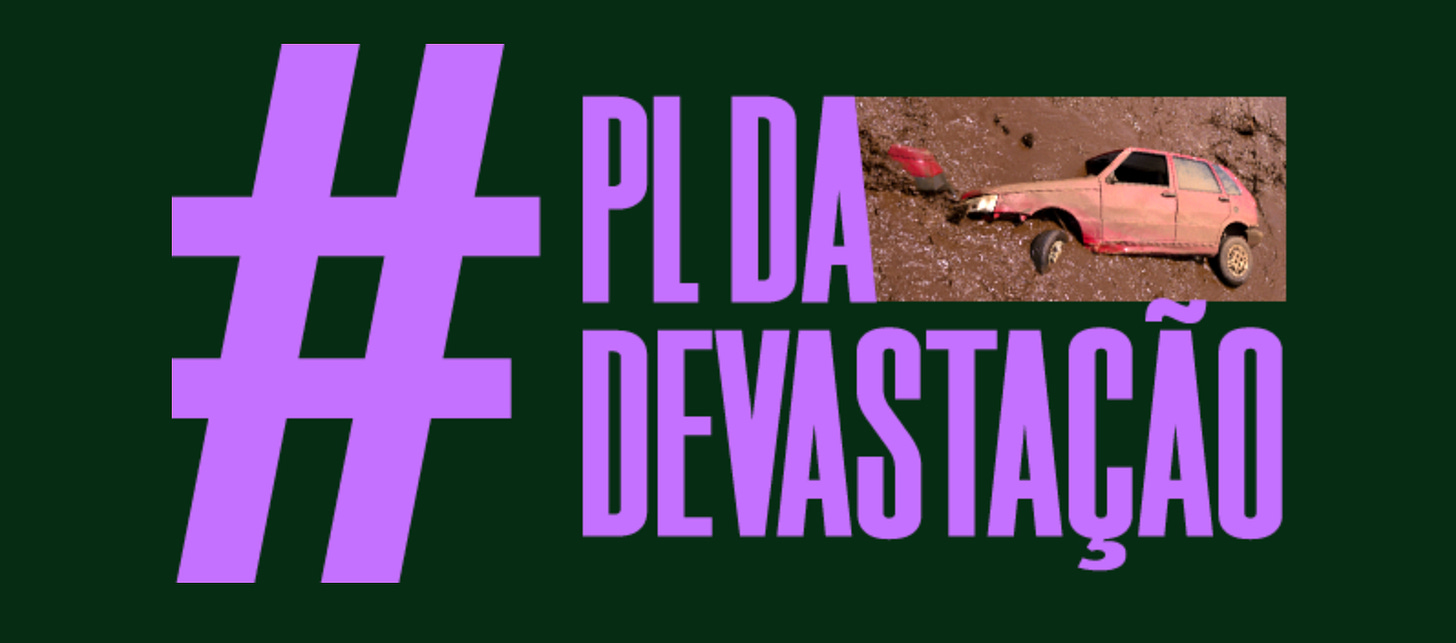"Brazil, I'm devastated"
The approval of the Devastation Bill by Brazil's Congress is one of the biggest blows to our ecosystems and chances at a good life. And this should take center stage as we prep for COP30 too.
As someone who circulates a lot in the world of climate research and climate activism, also having participated in COPs before, I get asked about COP30 all the time. And honestly, sometimes people abroad are disappointed in how I talk about it.
The fact is that, as much as I've become a COP skeptical, I'd still have a bit of faith in Brazil hosting it if we weren't under so much distress, domestically, trying to hold on to what is left of our environmental legislation. But, in one more chapter of "Brazil is hosting COP30, but environmental destruction is still the norm at home", our Congress passed legislation that will destroy environmental licensing and allow harmful industries to "self-license". We've named it the Devastation Bill.
One day we're fighting the presidential office because of its promotion of fossil fuels as development and the flaws of the corporate energy transition. Our struggle for a fossil fuel phase-out is still dismissed even among allies and our industrial policy may be greening, but with lots of problems and an overly technocratic approach that reduces social participation to meetings. We have to hear constantly that “we need to invest in more fossil fuels in order to finance the energy transition", even though I'm confident that the people in government and at Petrobras who say it know it to be a big fat lie. In fact, it's quite the opposite. We have studies that show that we use oil revenue to invest in more oil. To top it off, we hear another lie. The one that Brazil is not at fault for climate change, so it has credit to spare in fossil fuel exploitation. Well, just because we're not among the top 10 biggest emitters in history because of oil, but due to land use change and deforestation, it doesn't mean that we can claim to be victims in this process. Our economic history is written through colonisation and agribusiness interests that added a lot of greenhouse gases to the atmosphere and we are liable for those emissions, whether they led to development or just more dependency.
Since most days we're also fighting our Congress, we're pretty tired. Just yesterday, Congress also approved use of fossil fuel social funds to renegotiate the debts of agribusiness producers when they lose their crops due to extreme climate events. So, they create the problem, then they take the royalties that were supposed to at least help with education, health care and our energy transition and use it in their favour when they are impacted by the problem they created. With the Devastation Bill, they'll be able to create even more climate and ecological problems, caring nothing about climate leadership and fighting ecocide. Not as long as they profit from it.
To sum it up, the Devastation Bill takes away power from federal environmental agencies, allowing industries to negotiate directly with local governments, which poses specific threats to biomes and water access, since every jurisdiction can promote their self-interest. It gives agribusiness the green light to circumvent licensing. It benefits big infrastructure projects that cut through conservation units, privileging mega dams and roads, posing even more of a threat to our Indigenous peoples who continue to be persecuted and murdered by criminals from mining and agrobusiness.
The Devastation Bill will let many enterprises simply "self-license" by filling out a form online. This will become the rule and a licensing assessment, the exception. "Upgrades" to existing enterprises won't need licenses anymore, even if it means expansion. Banks are also celebrating, since they'll be immune to lawsuits associated with environmental damage from enterprises they finance. With the Devastation Bill, these enterprises are not even required to deal with damages. Public funds will end up footing the bill, even more than usual!
Disasters like Mariana and Brumadinho will tend to become more common. It is the normalisation of ecocide, while Brazil already faces the impact of big climate collapse and disasters. Congressmen from Rio Grande do Sul, which was under water for over a month last year, voted in favor of this bill.
This means that Brazil's obsession with oil developmentalism is not the only threat to meeting our climate targets anymore. The rule will be: fires, deforestation, more cattle and animal exploitation, and new roads, rail and waterways to make paths for commodity exports.
COP30 has been celebrated for being different this time: it's in the Amazon! But our traditional peoples have been excluded from strategic decisions, inhabitants of Belém are being evicted by landlords who want to make money from airbnb during COP, and greenwashing will be everywhere. The same congressfolk voting against nature and the very conditions of human life in Brazil will parade themselves during COP30, hoping to close deals, to grab a piece off the climate financing and bioeconomy pies. We hope Lula will veto this bill, knowing that climate action starts at home! We're not sure, but the next few days will be dedicated to pressuring the presidential office - without forgetting that Congress probably has another package of horrors waiting for us the next day.
Our climate struggle is a class struggle and those keeping an eye on COP30 should know we are tired, but still ready for battle.




Unfortunately, the idea of Brazil as an environmental powerhouse that it tries to sell abroad doesn't match reality. It's literally just for show. In real life, we're governed by a mafia of bankers, monopolies, land barons, and foreign powers. Great insight, Sabrina.